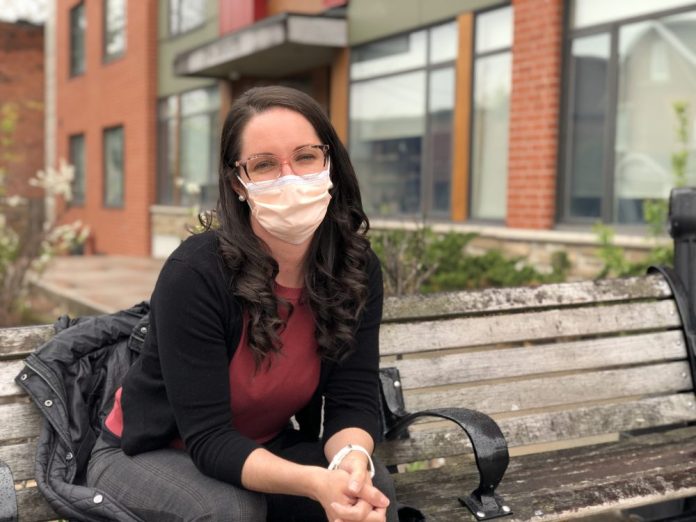Submitted by Cornerstone Housing for Women
*Trigger warning
When he used to pin me against a wall, I remember thinking I was still in control of the situation – even in the experience of my trauma I tried to manage it by using de-escalation techniques including aftercare, debrief, and reconnecting. As a person who has committed their entire professional career to the most marginalized women and gender-diverse people in our country – I knew how to handle trauma and crisis well.
Even when it was my own. Especially when it was my own.
I am a white professional director of a medium-sized non-profit- Cornerstone Housing for Women. You might see my successes, but you do not see my Post Traumatic Stress Disorder.
You don’t see the triggers behind wearing a mask.
Women’s experiences behind the mask of this pandemic have not been talked about enough, nor has it been at the forefront of major pandemic regulations and policy decisions.
May 3-9 is Mental Health Awareness Week and we must come together without judgment, with compassion, and with a call to end the stigma around Mental Health. We must work together to find tangible solutions for post-pandemic life that ensures everyone has access to safe, mental health supports that take a trauma-informed, gender-based lens.
The main priority during this pandemic has been to keep people safe from COVID-19. Unfortunately, what is meant to keep us safe is heavily laden with memories that replicate the trauma of the past for so many.
I, for instance, try not to be triggered by what it means to wear a mask, the feeling of his hand over my mouth silencing my voice and limiting my breath. Or to be locked in my home, it is oddly reminiscent of those difficult years, where I was not “allowed” to see my friends or family. These restrictions bring me back to a time in my life when I was silenced and controlled, as it does for many other women we support.
What is keeping us safe, is not keeping all of us well.
We know this is where we have to start because we are seeing a rise of women needing shelter and support every day. We see an increase in mental health issues, in women struggling with substance use disorders, and an increase in women struggling through trauma – all without a place to call home.
Women are inexplicably policed; from our bodies to our decision making I work at Cornerstone Housing for Women as a means of supporting women’s voices. When I am encouraging a woman to wear a mask– I am policing her, but it’s keeping her safe, right?
Cornerstone’s Emergency Women’s Shelter grew by 102 per cent in merely three months starting in December 2020 and we still cannot keep up with the increasing need of women that require urgent care.
We serve over 230 women every single day and this pandemic is affecting all of them in different ways, just as it is for you and me.
Let’s come together to reduce the stigma around mental health, let’s fight for mental health strategies and a recovery plan that takes into consideration the lived realities of women, and let’s push for more affordable, supportive housing for women in Ottawa.
Please remember, there is always a story behind the mask, be kind,
Sarah Davis, Executive Director of Cornerstone Housing for Women
Cornerstone provides emergency shelter and supportive housing to women in Ottawa. Sarah has been supporting vulnerable populations – primarily women that are at risk or have experienced homelessness – for over 15 years. Sarah is honoured to be an advocate for the women of Ottawa and proud to be working alongside the compassionate Cornerstone Community.
